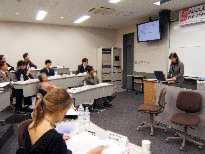Retailing in Taiwan: competition in international and domestic retailing
CHUNG, Su-Lin
Akita International University
INTRODUCTION

The liberalization of capital investment in Taiwan in the service industries (retailing and wholesaling are included) took place in 1986. This is earlier than 1996 in Korea and 1992 in China. In the 20th anniversary year, ironically, two big international retailers, Tesco (UK) and Casino (France) , decide to pull out of the Taiwan retail market in 2006. Carrefour (France) has been the leading hypermarket in Taiwan since 1996. The remarkable developments in Taiwan encouraged their business expansion in Asia which picked up in the latter half of the 1990’s. However, not all the international retailers have had a good experience in Taiwan. Tesco and Casino are two examples. Before Tesco and Casino decide to pull out of the Taiwan retail market in 2006, there were more than ten Japanese supermarkets that had pulled out of the Taiwan retail market.
The purpose of this paper is to investigate the reality of competition in international and domestic retailing in Taiwan through analyzing the whole picture of retailing trends in Taiwan and also by examining the higher rank retailers in each major retailing type. On my previous studies, I analyzed two largest retailers, Taiwan 7-Eleven and Carrefour, and demonstrated the marketing development of Taiwan 7-Eleven (Chung, 2001a and 2005) and the localization process of Carrefour (Chung and Yahagi, 2002). Kawabata (2006) examined the development of Japanese retailers in Taiwan and shows that Japanese supermarkets have difficulty in the market; in contrast, Japanese departments give great impact on the retail market of Taiwan. However, the whole picture of Taiwan retailing and also the characteristics of the international and domestic retailer in Taiwan are not clear enough.
Before entering directly into an investigation of the Taiwan retail market, I would like to describe briefly the retail modernization process in Taiwan. At the end of 1970’s, 7-Eleven was introduced as a vertical integration company of the modern retail channel by Uni-President, the largest food manufacturer. Before that, the Taiwan retail market was dominated by small traditional retailing outlets and few local department stores. The success of the Taiwan 7-Eleven in 1980’s affected Taiwanese government policy which resulted in the liberalization of capital investment in the service industries in 1986. Also, it encouraged many food manufacturers to extend their businesses into the retailing market (Chung 2001b and 2005).
In 1987, the first Japanese department store chain, Pacific Sogo, opened their first shop in Taipei. They influenced the Taiwan retail market by providing good service and higher quality products resulting in a Japan department store boom. This impact is still going on. 1 In the year of 2005, the sales of the first Pacific Sogo shop are more than 17.5 billion. It was occupied the first store sales rank for a long time.
In 1989, Makro (Netherlands) and Carrefour entered into the Taiwan retail market by the way of a joint venture. They provided a product of rich selection and lower price and by providing one-story-shopping they substantially changed the buying behavior of Taiwan’s consumer. Therefore, some media said that, the entry of Makro and Carrefour was the beginning of “the distribution revolution” in Taiwan.
All in all, the modernization development of retail in Taiwan progressed from the department stores in 1970’s, supermarket and convenience stores in 1980’s, hypermarkets in 1990’s, and in 2000’s are drugstores, large specialty shops, shopping malls, and so on. There are more and more different types of retailing appearing in the Taiwan market.
In the next section, we consider the trend of retailing in Taiwan by analyzing the government statistical data. Investigating the higher rank retailers in the major retail categories will be covered in a later section.
